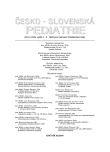Variable Manifestation of Dystrophic Curschmann-Steinert Myotonia as a Result of Genomic Imprinting
Různorodá manifestace dystrofické myotonie Curschmannovy-Steinertovy v důsledku genomického imprintingu
Dystrofická myotonie je autozomálně dominantně dědičné onemocnění charakterizované myotonií, svalovou slabostí, kataraktou, kardiálními poruchami se změnami EKG a incidencí 1 : 8000. Heterozygotní mutace DMPK genu na chromozomu 19 má charakter zmnožení tripletových opakování CTG, klinická závažnost se mění v závislosti na počtu tripletových opakování, mírné formy se projeví při 50–80 opakováních, těžké formy při opakováních více než 2000 tripletů CTG. Přímá molekulárně-genetická diagnostika je proto bezproblémová. Nicméně afekce je nedostatečně diagnostikována vzhledem k velmi různorodé klinické manifestaci v závislosti na pohlaví rodiče, od kterého je mutace zděděna – v důsledku genomického imprintingu.
Autorky referují rodinu geneticky vyšetřovanou po perinatálním úmrtí dvou dětí na pozdní asfyktický syndrom, jehož etiologie byla objasněna potvrzením familiárního výskytu dystrofické myotonie. Objasněná etiologie umožnila v další reprodukci rodiny nabídnout cílenou prevenci prenatální diagnostiku odpovědné mutace již v prvním trimestru těhotenství.
Klíčová slova:
dystrofická myotonie, amplifikace tripletů CTG, autozomálně dominantní dědičnost, pozdní asfyktický syndrom, variabilní expresivita, genomický imprinting
Authors:
E. Seemanová; Z. Mušová
Authors‘ workplace:
Oddělení klinické genetiky Ústavu biologie a lékařské genetiky UK 2. LF, Praha
vedoucí MUDr. M. Havlovicová
Published in:
Čes-slov Pediat 2007; 62 (7-8): 451-454.
Category:
The current Case
Overview
Myotonic dystrophy is an autosomal dominant disorder characterized by myotonia, muscular weakness, cataracts, heart blocks or arrythmia with ECG changes and population incidence 1 : 8000. Heterozygotic mutation of DMPK gene on chromosome 19 is characterized by expansion of trinucleotide CTG repeats and the severity varies with the number of repeats, mildly affected person having from 50 to 80, severely affected patients over 2000 CTG triplets. Direct molecular genetic diagnosis is therefore unproblematic. Nevertheless this affection is underdiagnosed due to very variable clinical manifestation depending on the number of repeats (premutation and full mutation) and sex of parent, from whom is the mutation inherited - effect of genomic imprinting.
Authors refer to the family, which was recommended for genetic care after the perinatal death of two children due to respiratory distress syndrome. The etiology of the infertility was elucidated in familiar occurrence of myotonic dystrophy. In future reproduction of the family early prenatal diagnosis of causal mutation could be offered.
Key words:
myotonic dystrophy, trinucleotide repeats expansion, autosomal dominant inheritance, respiratory distress syndrome, variability of expression, genomic imprinting
Labels
Neonatology Paediatrics General practitioner for children and adolescentsArticle was published in
Czech-Slovak Pediatrics

2007 Issue 7-8
- What Effect Can Be Expected from Limosilactobacillus reuteri in Mucositis and Peri-Implantitis?
- The Importance of Limosilactobacillus reuteri in Administration to Diabetics with Gingivitis
-
All articles in this issue
- Detection of Ectopic Gastric Mucosa by Means of Scintigraphy with 99mTc-Pertechnetate in Children
- Familial Hypobetalipoproteinemia
- Rethore Syndrome (Trisomy 9p)
- EuroGentest: an EU-funded Project for Harmonisation and Improvement of the Quality of Genetic Services
- Individualized Protein Fortification of Human Breast Milk in Newborns of Lower Birth Weight: the Key for Decreasing Morbidity?
- Variable Manifestation of Dystrophic Curschmann-Steinert Myotonia as a Result of Genomic Imprinting
- Czech-Slovak Pediatrics
- Journal archive
- Current issue
- About the journal
Most read in this issue
- Rethore Syndrome (Trisomy 9p)
- Individualized Protein Fortification of Human Breast Milk in Newborns of Lower Birth Weight: the Key for Decreasing Morbidity?
- Familial Hypobetalipoproteinemia
- Variable Manifestation of Dystrophic Curschmann-Steinert Myotonia as a Result of Genomic Imprinting
